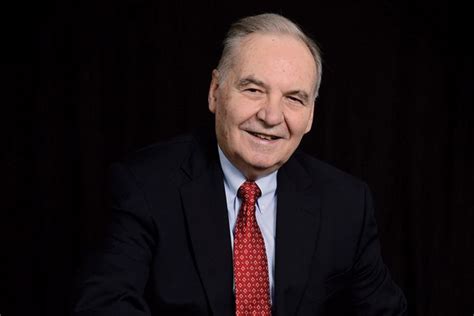Top 1200 Moral Relativism Quotes & Sayings
Explore popular Moral Relativism quotes.
Last updated on April 14, 2025.
Above all, creators remain drawn to the age-old paradoxes that philosophy grapples with [and]...that art occasionally resolves...the problem of the one and the many; unity and variety; determinism and freedom; mechanism and vitalism; good and evil; time and eternity; the plenum and the void; moral absolutism and relativism... These are the basic problems of human existence, and as far as we possibly can we arrange things to forget them.
My first fundamental premise of our faith is that God is real and so are eternal truths and values not provable by current scientific methods. These ideas are inevitably linked. Like other believers, we proclaim the existence of the ultimate lawgiver, God our Eternal Father, and the existence of moral absolutes. We reject the moral relativism that is becoming the unofficial creed of much of modern culture.
A dictatorship of relativism is being built that recognizes nothing as definite, and which leaves as the ultimate measure only one's ego and desires ... Having a clear faith, according to the credo of the church, is often labeled as fundamentalism. Yet relativism, that is, letting oneself being carried 'here and there by any wind of doctrine,' appears as the sole attitude good enough for modern times.
My version of relativism is pluralistic and attributes functions to morality that in combination with human nature place limits on what could count as a true morality. Unlike many other relativists, I do not hold that people are subject to a morality because they all belong to a certain group. That is, I don't hold that being a member of a group makes one's subject to some set of generally accepted norms. What is true is that others around us teach us morality and moral language, so they inevitably influence us.
The idea of cultural relativism is nothing but an excuse to violate human rights. Human rights is the fruit of various civilizations. I know of no civilization that tolerates or justifies violence, terrorism, or injustice. There is no civilization that justifies the killing of innocent people. Those who are invoking cultural relativism are really using that as an excuse for violating human rights and to put a cultural mask on the face of what they're doing.
Moral Injury is differentiated from PTSD in that it directly relates to guilt and shame veterans experience as a result of committing actions that go against their moral codes. Therapists who study and treat moral injury have found that no amount of medication can relieve the pain of trying to live with these moral burdens.
I went to a fundamentalist Christian high school and went to a fundamentalist church, and they were the greatest people; there was an amazing sense of community. The problem is when the messiness of real life enters, and the inflexibility of a moral code cannot cope with the realities of moral relativism.
Why are people so concerned with relativism? If you look back in history, millions of people were killed because of someone's dogmatic views, but I do not remember anybody being killed due to the tolerance of difference, to relativism; ethically relativism does not seem to be such an awful thing, really.
I suffer the anthropological malady diagnosed by Le vi- Strauss inTristes tropiques: I find it much more difficult to suspend value judgments about the society in which I normally reside than I do abroad. It takes physical and cultural distance to gain moral detachment and political noncommitment. Relativism implies a solid measure of indifference.
Can an idea a notion as abstract as Relativism produce by itself the effects alleged? cause all the harm, destroy all the lives and reputations? I am as far as anyone can be from denying the power of ideas in history, but the suggestion that a philosophy (as Relativism is often called) has perverted millions and debased daily life is on the face of it absurd. No idea working alone has ever demoralized society, and there have been plenty of ideas simpler and more exciting than Relativism.
The American elite is almost beyond redemption. . . . Moral relativism has set in so deeply that the gilded classes have become incapable of discerning right from wrong. Everything can be explained away, especially by journalists. Life is one great moral mush--sophistry washed down with Chardonnay. The ordinary citizens, thank goodness, still adhere to absolutes.... It is they who have saved the republic from creeping degradation while their 'betters' were derelict.
"Judge not, that ye be not judge"... is an abdication of moral responsibility: it is a moral blank check one gives to others in exchange for a moral blank check one expects for oneself. There is no escape from the fact that men have to make choices; so long as men have to make choices, there is no escape from moral values; so long as moral values are at stake, no moral neutrality is possible. To abstain from condemning a torturer, is to become an accesory to the torture and murder of his victims. The moral principle to adopt... is: "Judge, and be prepared to be judged."
For nearly a century, the moral relativism of science has given faith-based religion--that great engine of ignorance and bigotry--a nearly uncontested claim to being the only universal framework for moral wisdom. As a result, the most powerful societies on early spend their time debating issues like gay marriage when they should be focused on problems like nuclear proliferation, genocide, energy security, climate change, poverty, and failing schools.
I have a whole section of a filing cabinet in my office full of ideas. Some are ideas for books or articles I want to write. One is a romantic comedy; one's about my dad's life. I've also got ideas for books on moral relativism as well as democracy and human nature. There's also a really cool concept for a spy novel.
No great, inspiring culture of the future can be built upon the moral principle of relativism. For at its bottom such a culture holds that nothing is better than anything else, and that all things are in themselves equally meaningless. Except for the fragments of faith (in progress, in compassion, in conscience, in hope) to which it still clings, illegitimately, such a culture teaches every one of its children that life is a tale told by an idiot, signifying nothing.
When you say there's too much evil in this world you assume there's good. When you assume there's good, you assume there's such a thing as a moral law on the basis of which to differentiate between good and evil. But if you assume a moral law, you must posit a moral Law Giver, but that's Who you're trying to disprove and not prove. Because if there's no moral Law Giver, there's no moral law. If there's no moral law, there's no good. If there's no good, there's no evil. What is your question?
We are now returning to the 18th century empirical approach with the new interest in the evolutionary basis of ethics, with 'experimental' moral philosophy and moral psychology. As a result, we understand better why moral formulas are experienced as ineluctable commands, even if there is no commander and even if the notion of an inescapable obligation is just superstition. So moral philosophy has made huge progress.
If I were to speak your kind of language, I would say that man's only moral commandment is: Thou shalt think.
But a 'moral commandment' is a contradiction in terms. The moral is the chosen, not the forced; the understood, not the obeyed.
The moral is the rational, and reason accepts no commandments.
We need strong Christians who can persevere against hardship, who can sustain hope through tragedy, who can lift others by their example and their compassion, and who can consistently overcome temptations. We need strong Christians who can make important things happen by their faith and who can defend the truth of Jesus Christ against moral relativism and militant atheism. What is the source of such moral and spiritual power, and how do we obtain it? The source is God. Our access to that power is through our covenants with Him.
At the center of the Christian faith is the affirmation that there is a God in the universe who is the ground and essence of all reality. A Being of infinite love and boundless power, God is the creator, sustainer, and conserver of values....In contrast to the ethical relativism of [totalitarianism], Christianity sets forth a system of absolute moral values and affirms that God has placed within the very structure of this universe certain moral principles that are fixed and immutable.
















































